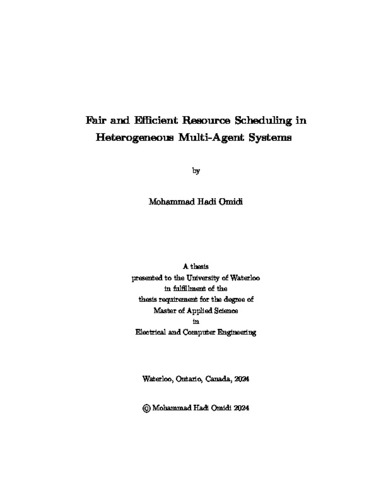| dc.contributor.author | Omidi, Mohammadhadi | |
| dc.date.accessioned | 2024-02-22 21:15:33 (GMT) | |
| dc.date.available | 2024-02-22 21:15:33 (GMT) | |
| dc.date.issued | 2024-02-22 | |
| dc.date.submitted | 2024-01-15 | |
| dc.identifier.uri | http://hdl.handle.net/10012/20362 | |
| dc.description.abstract | The performance of machine-learning applications heavily relies on the choice of the underlying hardware architecture, encompassing factors such as computational power, scalability, memory, and storage capabilities. These hardware choices significantly impact the efficiency and effectiveness of machine-learning systems. Resource-intensive programs can lead to competition for system resources, causing delays, while inefficient resource usage can saturate resources and harm user experience. To address resource variation among applications, resource sharing is implemented, allowing applications to dynamically allocate resources as needed, promoting efficient resource utilization. However, resource-allocation strategies often prioritize performance, potentially overlooking fairness among users or applications, especially in shared environments. Balancing performance optimization and fair resource-allocation is a complex challenge, requiring mechanisms that encourage resource sharing, prevent envy, and ensure a fair distribution of resources. Incorporating these characteristics promotes collaboration, minimizes negative emotions, and prioritizes the well-being of all participants in the system.
This research introduces an innovative resource-allocation mechanism that addresses shortcomings in traditional methods. Our method prioritizes both fairness and efficiency in resource distribution, utilizing a token-based mechanism to ensure fairness and implementing individual preferences based on learned thresholds through an Actor-Critic method to improve efficiency. A computer simulation involving 40 accelerators and 20 agents in different environments demonstrates a performance improvement 1.28× compared to standard approaches. This study contributes by shedding light on the complex challenges of resource- allocation in heterogeneous systems and providing a practical solution with our approach. | en |
| dc.language.iso | en | en |
| dc.publisher | University of Waterloo | en |
| dc.subject | heterogeneous systems | en |
| dc.subject | multi-agent systems | en |
| dc.subject | game theory | en |
| dc.subject | cloud systems | en |
| dc.subject | hardware accelerators | en |
| dc.title | Fair and Efficient Resource Scheduling in Heterogeneous Multi-Agent Systems | en |
| dc.type | Master Thesis | en |
| dc.pending | false | |
| uws-etd.degree.department | Electrical and Computer Engineering | en |
| uws-etd.degree.discipline | Electrical and Computer Engineering | en |
| uws-etd.degree.grantor | University of Waterloo | en |
| uws-etd.degree | Master of Applied Science | en |
| uws-etd.embargo.terms | 0 | en |
| uws.contributor.advisor | Kapre, Nachiket | |
| uws.contributor.advisor | Zahedi, Seyed Majid | |
| uws.contributor.affiliation1 | Faculty of Engineering | en |
| uws.published.city | Waterloo | en |
| uws.published.country | Canada | en |
| uws.published.province | Ontario | en |
| uws.typeOfResource | Text | en |
| uws.peerReviewStatus | Unreviewed | en |
| uws.scholarLevel | Graduate | en |

